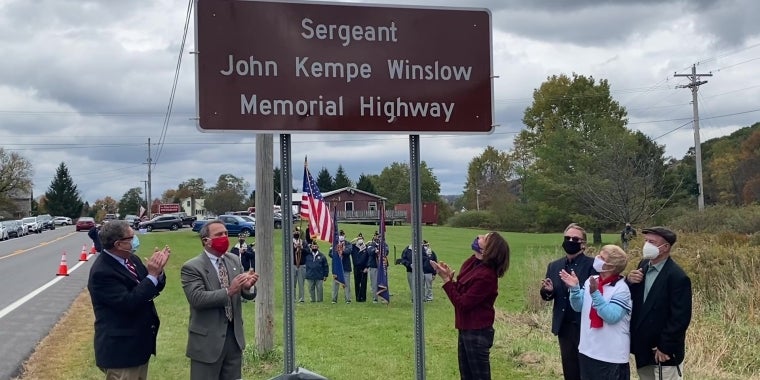
Senate Moves To Strengthen Megan's Law
Ten years after the enactment of legislation creating New York State’s Sex Offender Registry, the New York State Senate will act today on the "Tenth Anniversary Omnibus Sex Offender Registration Reform Act." The bill (S.4793-B) would strengthen Megan’s Law in 25 ways, including: mandatory notification by police when a registered sex offender moves into a community, lifetime registration of all sex offenders, requiring information about all levels of sex offenders to be posted on the Internet, and GPS monitoring for the worst offenders.
"For the last decade, Megan’s Law has empowered parents and concerned members of the community with the information needed to protect their families from dangerous sexual predators," said Senator James L. Seward, cosponsor ofthe originalMegan’s Law. "By incorporating ten years of experience and revolutionary new technologies, the Omnibus Megan’s Law Reform Act strengthens Megan’s Law in 25 different ways to better protect our children and provide parents with a greater sense of security."
"The public hearings my committee has held clearly demonstrate the strong public support for increased security and public notification of any sexual offenders living in a community," said Senator Michael Nozzolio (R-C, Fayette), Chairman of the Senate Committee on Crime Victims, Crime, and Corrections. "Sexual predators cannot be rehabilitated and the statistics show the highest recidivism rates for these dangerous and depraved criminals. I look forward to continue to gain the input of community leaders and working with Senate Majority Leader Joe Bruno and Senator Dean Skelos to keep our streets safe and our children secure from sexual offenders."
"Megan’s Law was truly one of the ground breaking criminal justice measures in the history of New York State, but there is always more that can be done to protect the citizens of New York and ensure that our children are kept safe," said Senate Majority Leader Joseph L. Bruno. "This legislation will keep our neighborhoods better informed and increase penalties for sexual predators who prey on the most vulnerable members of our communities -- our children."
The "Tenth Anniversary Omnibus Sex Offender Registration Reform Act" would require:
Mandatory Community Notification:
Under current law, it is left up to the discretion of the police whether they notify community members about the presence of a sex offender. Under this legislation, police must take the following actions based on the offender’s level:> Level One Offenders: Mandatory notification of law enforcement agencies where the crime was committed and, upon release, where the offender intends to reside.
> Level Two Offenders: Law enforcement agencies where the crime was committed and, upon release, where the offender intends to reside must be notified. In addition, police must disseminate information, including a photograph, to entities with vulnerable populations, such as schools. The information may be further disseminated.
> Level Three Offenders: The requirements for notification for Level Three offenders are the same as Level Two but in addition, law enforcement agencies must issue a news release to local media. They also may use their discretion to conduct other notification activities within the community, including public meetings, flyers, etc.
Lifetime Registration:
This bill would require the lifetime registration of all sex offenders. Under current law, only the worst offenders are required to register for life. Most sex offenders are registered for just ten years before they drop off the registry.By next year, the names and information of more than 3,200 sex offenders will be dropped from the registry because they have met the 10-year mandate to keep police posted of their whereabouts.
Website and Electronic Communication:
This legislation expands the Division of Criminal Justice Services’ website to include information about all sex offenders, not only the Level Three offenders under current law. In addition, visitors to the website would be able to register for e-mail notification regarding sex offenders living in, or relocating to, their zip code.> Level One Offenders: The website must provide a name, a dated photograph, and approximate address.
> Level Two Offenders: The website must provide the same information as Level One Offenders, plus additional material regarding the offender’s crime and type of victim.
> Level Three Offenders: The website must provide a name, a dated photograph, place of employment, exact address, and other information relating to the offender and his or her criminal background.
Global Positioning System (GPS) Tracking:
This legislation would require all Level Three offenders to wear a GPS monitoring device for the duration of his or her registration. The Act includes numerous provisions relating to the type of GPS system the offender must wear, the offender’s required contribution to its cost, penalties for the removal or disabling of the tracking device, and judicial authority to modify the tracking equipment."It doesn't make sense that we have electronic monitoring of Martha Stewart, while the most dangerous sexual predators roam free to prey on our children and families," said Senator John Bonacic (R-I-C, Mount Hope), who is sponsoring GPS legislation in the Senate.
In addition, the "Tenth Anniversary Omnibus Sex Offender Registration Reform Act" also does the following:
> adds three crimes to the list of registerable offenses:
> sexual assault against a child by a person in a position of trust in the first degree;
> sexual assault against a child by a person of trust in the second degree; and
> endangering the welfare of a child where sexual activity is involved;
> adds sexual assault against a child by a person in a position of trust in the first degree to the list of sexually violent offenses;
> verification forms will be mailed to sex offenders twice a year on a random basis, rather than once a year on the anniversary date;
> even if an offender has not moved, they will be in violation if they do not send back their signed verification card;
> changes the determination hearing process in the following ways:
> the notice to the sex offender will tell them the hearing will determine how much information the community will receive;
> requires sex offenders to appear at the hearing which will determine their level of notification and whether they are designated as a sexual predator, sexually violent offender, or predicate sex offender;
> if an offender fails to appear at their registration hearing, the hearing will be conducted in their absence;
> a sex offender who has been convicted outside of New York will be given notice of the hearing that will determine how long they must register and how much information will be given to the public;
> if an out of state offender fails to appear, the court will still make a determination;
> no longer allows sex offenders to petition the court for a change in their duration of registration;
> amends the correction law in relation to what constitutes failure to register on the part of the sex offender, and the penalties for failing to register;
> changes the conditions of probation or parole that prohibit a sex offender from going on school grounds to eliminate the necessity that the victim be less than 18 at the time of the offense;
> creates the new crime of unlawfully residing or entering upon school grounds in the second degree. No sex offender may go on school grounds;
> increases the statute of limitations for a sex offense against a child under the age of 17 to 15 years, from 5 years, after the child reaches the age of 18; and
> requires that when individual who is charged with a sex offense, incest, or sexual performance, any plea agreement must include a guilty plea to one of these crimes.
The legislation is the result of three public hearings held by the Senate Majority in Albany, Long Island and Brooklyn over the past month. Law enforcement officials, teachers, school officials, parents, and advocates participated in the hearings to discuss a variety of issues surrounding sex offenders and Megan’s Law. Megan’s mother, Maureen Kanka, who partnered with Senator Skelos in 1995 to champion the passage of Megan’s Law in both houses of the Legislature, spoke at the first hearing in Albany.
Since enacting Megan’s Law in 1995, the New York State Senate has acted on 68 separate occasions to pass legislation strengthening Megan’s Law and 180 times on other legislation dealing with sex offenders.
Since 1997, the Senate has passed legislation that would provide for the civil commitment of sexually violent predators who are likely to engage in repeated acts of sexual violence. The most recent version of the bill (S.3273, sponsored by Senator Dale Volker, R-C-I, Depew) was passed the Senate in April of 2005 and was sent to the Assembly.
"The State Senate has consistently supported tougher penalties sex offenders for those who prey upon our young people and our children," said Senator Volker. "Since the United States Supreme Court decided in 1997 that Civil Commitment of sex offenders is constitutional, we have passed this common sense legislation year after year to keep those who sexually assault our children off the street. I firmly believe that with the expansion of Megan’s Law, the enactment of the Civil Commitment bill will appropriately complement our criminal justice policies and make a tremendous impact in reducing this criminal behavior."
####



